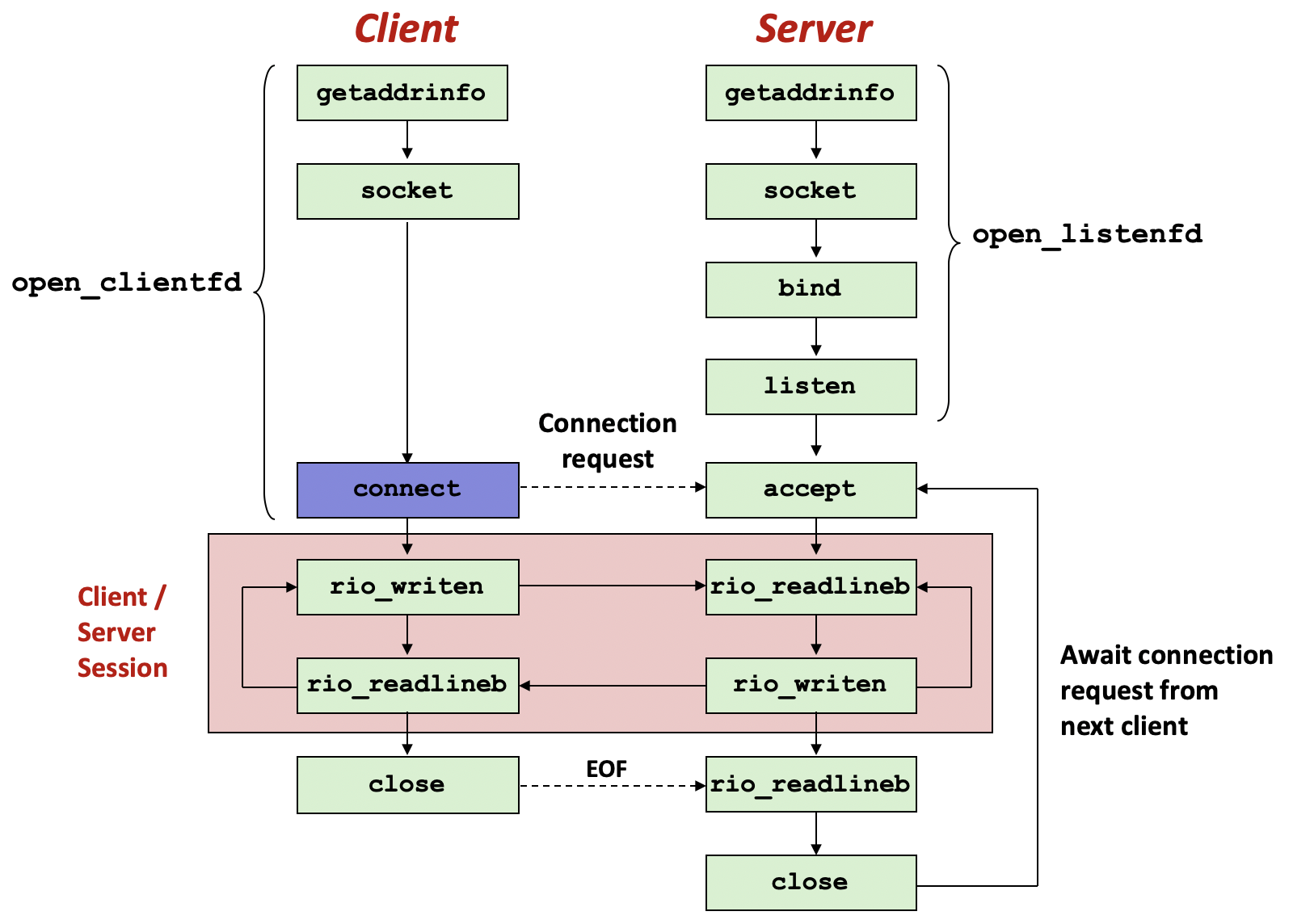
获取域名的地址
#include "csapp.h"
int main(int argc, char **argv)
{
struct addrinfo *p, *listp, hints;
char buf[MAXLINE];
int rc, flags;
/* Get a list of addrinfo records */
memset(&hints, 0, sizeof(struct addrinfo));
hints.ai_family = AF_INET; /* IPv4 only */
hints.ai_socktype = SOCK_STREAM; /* Connections only */
if ((rc = getaddrinfo(argv[1], NULL, &hints, &listp)) != 0) {
fprintf(stderr, "getaddrinfo error: %s\n", gai_strerror(rc));
exit(1);
}
/* Walk the list and display each IP address */
flags = NI_NUMERICHOST; /* Display address instead of name */
for (p = listp; p; p = p->ai_next) {
Getnameinfo(p->ai_addr, p->ai_addrlen,
buf, MAXLINE, NULL, 0, flags);
printf("%s\n", buf);
}
/* Clean up */
Freeaddrinfo(listp);
exit(0);
}
建立连接
int open_clientfd(char *hostname, char *port) {
int clientfd;
struct addrinfo hints, *listp, *p;
/* Get a list of potential server addresses */
memset(&hints, 0, sizeof(struct addrinfo));
hints.ai_socktype = SOCK_STREAM; /* Open a connection */
hints.ai_flags = AI_NUMERICSERV; /* …using numeric port arg. */
hints.ai_flags |= AI_ADDRCONFIG; /* Recommended for connections */
Getaddrinfo(hostname, port, &hints, &listp);
/* Walk the list for one that we can successfully connect to */
for (p = listp; p; p = p->ai_next) {
/* Create a socket descriptor */
if ((clientfd = socket(p->ai_family, p->ai_socktype,
p->ai_protocol)) < 0)
continue; /* Socket failed, try the next */
/* Connect to the server */
if (connect(clientfd, p->ai_addr, p->ai_addrlen) != -1)
break; /* Success */
Close(clientfd); /* Connect failed, try another */
}
/* Clean up */
Freeaddrinfo(listp);
if (!p) /* All connects failed */
return -1;
else /* The last connect succeeded */
return clientfd;
}
int open_listenfd(char *port)
{
struct addrinfo hints, *listp, *p;
int listenfd, optval=1;
/* Get a list of potential server addresses */
memset(&hints, 0, sizeof(struct addrinfo));
hints.ai_socktype = SOCK_STREAM; /* Accept connect. */
hints.ai_flags = AI_PASSIVE | AI_ADDRCONFIG; /* …on any IP addr */
hints.ai_flags |= AI_NUMERICSERV; /* …using port no. */
Getaddrinfo(NULL, port, &hints, &listp);
/* Walk the list for one that we can bind to */
for (p = listp; p; p = p->ai_next) {
/* Create a socket descriptor */
if ((listenfd = socket(p->ai_family, p->ai_socktype,
p->ai_protocol)) < 0)
continue; /* Socket failed, try the next */
/* Eliminates "Address already in use" error from bind */
Setsockopt(listenfd, SOL_SOCKET, SO_REUSEADDR,
(const void *)&optval , sizeof(int));
/* Bind the descriptor to the address */
if (bind(listenfd, p->ai_addr, p->ai_addrlen) == 0)
break; /* Success */
Close(listenfd); /* Bind failed, try the next */
}
/* Clean up */
Freeaddrinfo(listp);
if (!p) /* No address worked */
return -1;
/* Make it a listening socket ready to accept conn. requests */
if (listen(listenfd, LISTENQ) < 0) {
Close(listenfd);
return -1;
}
return listenfd;
}
示例:主线程echo服务器
#include "csapp.h”
void echo(int connfd);
int main(int argc, char **argv)
{
int listenfd, connfd;
socklen_t clientlen;
struct sockaddr_storage clientaddr; /* Enough room for any addr */
char client_hostname[MAXLINE], client_port[MAXLINE];
listenfd = Open_listenfd(argv[1]);
while (1) {
clientlen = sizeof(struct sockaddr_storage); /* Important! */
connfd = Accept(listenfd, (SA *)&clientaddr, &clientlen);
Getnameinfo((SA *) &clientaddr, clientlen,
client_hostname, MAXLINE, client_port, MAXLINE, 0);
printf("Connected to (%s, %s)\n", client_hostname, client_port);
echo(connfd);
Close(connfd);
}
exit(0);
}
void echo(int connfd)
{
size_t n;
char buf[MAXLINE];
rio_t rio;
Rio_readinitb(&rio, connfd);
while((n = Rio_readlineb(&rio, buf, MAXLINE)) != 0) {
printf("server received %d bytes\n", (int)n);
Rio_writen(connfd, buf, n);
}
}
示例:多进程并发echo服务器
int main(int argc, char **argv)
{
int listenfd, connfd;
socklen_t clientlen;
struct sockaddr_storage clientaddr;
Signal(SIGCHLD, sigchld_handler);
listenfd = Open_listenfd(argv[1]);
while (1) {
clientlen = sizeof(struct sockaddr_storage);
connfd = Accept(listenfd, (SA *) &clientaddr, &clientlen);
if (Fork() == 0) {
Close(listenfd); /* Child closes its listening socket */
echo(connfd); /* Child services client */
Close(connfd); /* Child closes connection with client */
exit(0); /* Child exits */
}
Close(connfd); /* Parent closes connected socket (important!) */
}
}
void sigchld_handler(int sig)
{
while (waitpid(-1, 0, WNOHANG) > 0)
;
return;
}
多线程并发echo服务器
int main(int argc, char **argv)
{
int listenfd, *connfdp;
socklen_t clientlen;
struct sockaddr_storage clientaddr;
pthread_t tid;
listenfd = Open_listenfd(argv[1]);
while (1) {
clientlen=sizeof(struct sockaddr_storage);
connfdp = Malloc(sizeof(int));
*connfdp = Accept(listenfd,
(SA *) &clientaddr, &clientlen);
Pthread_create(&tid, NULL, thread, connfdp);
}
}
/* Thread routine */
void *thread(void *vargp)
{
int connfd = *((int *)vargp);
Pthread_detach(pthread_self());
Free(vargp);
echo(connfd);
Close(connfd);
return NULL;
}
